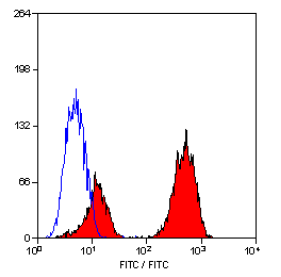CD3E Mouse Monoclonal Antibody [Clone ID: UCHT1]
Specifications
| Product Data | |
| Clone Name | UCHT1 |
| Applications | FC, IHC |
| Recommended Dilution | Flow Cytometry: Use 10 µl of 1/100-1/200 diluted antibody to label 10e6 cells or 100µl of lysed whole peripheral blood. Immunohistochemistry on Frozen Sections. |
| Reactivities | Human, Monkey |
| Host | Mouse |
| Isotype | IgG1 |
| Clonality | Monoclonal |
| Immunogen | Human infant thymocytes and lymphocytes from a patient with Sezary Syndrome. Spleen cells from immunised BALB/c mice were fused with cells of the P3/NS1/1-Ag4-1 mouse myeloma cell line. |
| Specificity | This antibody recognises a surface protein of peripheral blood T cells of molecular weight 19kD. As a pan T cell marker this antibody is present on more than 95% of circulating human peripheral T cells. |
| Formulation | State: Purified State: Liquid purified IgG containing 0.09% Sodium Azide as preservative. |
| Concentration | lot specific |
| Purification | Affinity Chromatography on Protein G. |
| Storage | Store the antibody undiluted at 2-8°C for one month or (in aliquots) at -20°C for longer. Avoid repeated freezing and thawing. |
| Stability | Shelf life: one year from despatch. |
| Database Link | |
| Background | T cell activation through the antigen receptor (TCR) involves the cytoplasmic tails of the CD3 subunits: CD3 gamma, CD3 delta, CD3 epsilon and CD3 zeta. These CD3 subunits are structurally related members of the immunoglobulins super family encoded by closely linked genes on human chromosome 11. The CD3 components have long cytoplasmic tails that associate with cytoplasmic signal transduction molecules. This association is mediated at least in part by a double tyrosine based motif present in a single copy in the CD3 subunits. CD3 may play a role in TCR induced growth arrest, cell survival and proliferation. The CD3 antigen is present on 68-82% of normal peripheral blood lymphocytes, 65-85% of thymocytes and Purkinje cells in the cerebellum. It is never expressed on B or NK cells. Decreased percentages of T lymphocytes may be observed in some autoimmune diseases. |
| Synonyms | T3/Leu-4 |
| Reference Data | |
Documents
| Product Manuals |
| FAQs |
{0} Product Review(s)
0 Product Review(s)
Submit review
Be the first one to submit a review
Product Citations
*Delivery time may vary from web posted schedule. Occasional delays may occur due to unforeseen
complexities in the preparation of your product. International customers may expect an additional 1-2 weeks
in shipping.






























































































































































































































































 Germany
Germany
 Japan
Japan
 United Kingdom
United Kingdom
 China
China



